Judicial Yuan
The Judicial Yuan (Chinese: 司法院; pinyin: Sīfǎ Yuàn; Pe̍h-ōe-jī: Su-hoat Īⁿ) is the judicial branch of the government of the Republic of China on Taiwan.[1][2] It runs a Constitutional Court and oversees all systems of courts in Taiwan, including ordinary courts like the supreme court, high courts, district courts as well as special courts like administrative courts and disciplinary courts. By Taiwanese law, the Judicial Yuan holds the following powers:[3]
- Interpretation — Constitutional Court interprets the Constitution and other statutes and regulations by either the central government or local governments.
- Adjudicate — Most civil, criminal, and administrative cases are adjudicated by the respective courts supervised by the Judicial Yuan. The Constitutional Court adjudicate Presidential impeachment and political party dissolution cases.
- Discipline — Disciplinary measures with respect to public functionaries are adjudicated by the Disciplinary court.
- Judicial Administration — The Judicial Yuan supervises all courts established by Taiwanese law.
| Judicial Yuan (Constitutional Court) | |
|---|---|
| 司法院 Sīfǎ Yuàn (Mandarin) Su-hoat Īⁿ (Taiwanese) Sṳ̂-fap Yen (Hakka) | |
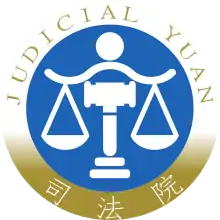 | |
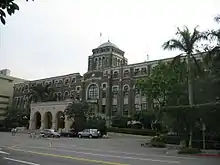 The Judicial Building houses the Constitutional Court | |
| Established | 1947 |
| Location | Zhongzheng, Taipei |
| Coordinates | 25.0379°N 121.5121°E |
| Composition method | Nominated by the President of the Republic and approved by Legislative Yuan |
| Authorized by | Additional Articles and original Constitution of the Republic of China |
| Judge term length | 8 years |
| Number of positions | 15 |
| Website | www.judicial.gov.tw |
| President and Chief Justice | |
| Currently | Hsu Tzong-li |
| Since | November 1, 2016 |
| Vice President and Justice | |
| Currently | Tsai Jeong-duen |
| Since | November 1, 2016 |
| Judicial Yuan | |||||||||||||||||||||||||||
|---|---|---|---|---|---|---|---|---|---|---|---|---|---|---|---|---|---|---|---|---|---|---|---|---|---|---|---|
| Chinese | 司法院 | ||||||||||||||||||||||||||
| |||||||||||||||||||||||||||
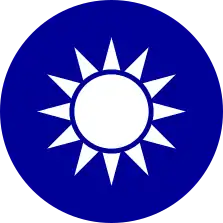 |
|---|
| This article is part of a series on the politics and government of the Republic of China |
|
|
According to the current Constitution,[2] the Constitutional Court shall have 15 justices. One justice shall be the President of the court, and another shall be the Vice President. All justices, including the President and Vice President, shall be nominated by the President of Taiwan and approved by the Legislative Yuan (the parliament of Taiwan). Upon approval, justices have a term limit of eight years, but this term limit does not apply to the President and Vice President.
Constitutional Court
Functions
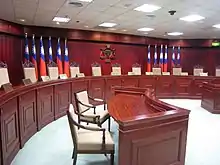
The Constitutional Court (Chinese: 憲法法庭; pinyin: Xiànfǎ Fǎtíng; Pe̍h-ōe-jī: Hiàn-hoat Hoat-têng), also known as the Council of Grand Justices (大法官會議), provides rulings on the following four categories of cases:
- Interpretation of the Constitution;
- Uniform interpretation of statutes and regulations;
- Impeachment of the President and Vice President of Taiwan; and
- Declaring the dissolution of political parties in violation of the Constitution.[1][2]
A petition for an interpretation of the Constitution shall be filed in the following circumstances:[3]
- Where a central or local government agency is uncertain regarding the application of the Constitution while exercising its powers, or, if the agency, while exercising its powers, has disputes with another agency regarding the application of the Constitution, or if the agency is uncertain of the constitutionality of a particular law or order when applying the same;[3]
- Where an individual, a juristic person, or a political party, alleges that his or its constitutional right has been infringed and who has exhausted all judicial remedies provided by law, questions the constitutionality of the law or order applied by the court of last resort in its final decision;[3]
- Where the Members of the Legislative Yuan, in exercising their powers, are uncertain regarding the application of the Constitution or with regard to the constitutionality of a particular law when applying the same, and at least one-third of the total number of the Members of the Legislative Yuan have filed a petition;[3] or
- Where any court believes that a particular law, which it is applying to a case pending with it, is in conflict with the Constitution.[3]
Justices
There are in total of 15 justices (Chinese: 大法官; pinyin: Dàfǎguān; Pe̍h-ōe-jī: Tōa-hoat-koaⁿ) serving in the Constitutional Court, current members are: [4]
| Chief Justice and President | Justice and Vice President | ||
|---|---|---|---|
| Hsu Tzong-li | Tsai Jeong-duen | ||
| Justices | |||
| Term from 2015 to 2023 | Term from 2016 to 2024 | Term from 2019 to 2027 | |
| Lin Jiun-Yi Huang Horng-Shya Tsai Ming-Cheng Wu Chen-Huan |
Chang Chong-Wen Hsu Chih-Hsiung Huang Jui-Ming Hwang Jau-Yuan Jan Sheng-Lin |
Lu Tai-Lang Shieh Ming-Yan Tsai Tzung-Jen Yang Hui-Chin | |
Important decisions
Important decisions of the Constitutional Court are listed as the following.
| No. | Date | Summary | Ref |
|---|---|---|---|
| 1 | Jan 6, 1949 | Legislative Yuan members shall not hold positions in executive government concurrently. | [5] |
| 31 | Jan 29, 1954 | Extended term of the first Legislative Yuan and Control Yuan indefinitely until the next elections in China. | [6] |
| 86 | Aug 15, 1960 | All high courts and district courts shall be organizationally placed under the Judicial Yuan | [7] |
| 99 | Dec 19, 1962 | The New Taiwan Dollar shall be the national fiat money, not local currency, and the Central Bank entrusted the issuance. | [8] |
| 261 | Jun 21, 1990 | Term of the first National Assembly, Legislative Yuan, and Control Yuan shall be terminated by December 31, 1991. This interpretation resulted in the total re-election of the National Assembly in 1991 and the Legislative Yuan in 1992. This interpretation also opened the subsequent legislative elections in Taiwan. |
[9] |
| 328 | Nov 11, 1993 | Coverage of the national territory shall not be interpreted by the Constitutional Court. | [10] |
| 365 | Sep 23, 1994 | Judged the jus sanguinis principle in the Taiwanese nationality law shall apply to both mother and father. | [11] |
| 499 | Mar 24, 2000 | Voided the 5th amendment of the Additional Articles of the Constitution | [12] |
| 644 | Jun 20, 2008 | Judged the ban of "advocate Communism or secession" in the Civil Associations Act as unconstitutional. | [13] |
| 748 | May 24, 2017 | Judged the statutory ban on same-sex marriage in the Taiwanese Civil Code as unconstitutional. The government shall take motion to legalize same-sex marriage in Taiwan. |
[14] |
| 791 | May 29, 2020 | Judged the criminalization of adultery as unconstitutional. |
Ordinary courts
Supreme court
The Supreme Court (Chinese: 最高法院; pinyin: Zuìgāo Fǎyuàn; Pe̍h-ōe-jī: Chòe-ko Hoat-īⁿ) is the court of last resort for civil and criminal cases. A civil case can be appealed to the Supreme Court only when more than NT $1,500,000 is at stake. Except for petty offences enumerated in Article 376 of the Code of Criminal Procedure, any criminal case may be appealed to the Court.
This Court exercises jurisdiction over the following cases:
- appeals from judgments of High Courts or their branches as courts of first instance in criminal cases;
- appeals from judgments of High Courts or their branches as courts of second instance in civil and criminal cases;
- appeals from rulings of High Courts or their branches;
- appeals from judgments or rulings rendered by the civil court of second instance by the summary procedure, the amounts in controversy exceeding NT $1,500,000, and with permission granted in accordance with specified provisions;
- civil and criminal retrials within the jurisdiction of the court of third instance;
- extraordinary appeals; or
- any other case as specified by laws.
High court

There are six High Court (Chinese: 高等法院; pinyin: Gāoděng Fǎyuàn; Pe̍h-ōe-jī: Ko-téng Hoat-īⁿ) branches in Taiwan:
| No. | Name | Chinese |
|---|---|---|
| 1 | Taiwan High Court | 臺灣高等法院 |
| 2 | Taiwan High Court Taichung Branch Court | 臺灣高等法院臺中分院 |
| 3 | Taiwan High Court Tainan Branch Court | 臺灣高等法院臺南分院 |
| 4 | Taiwan High Court Kaohsiung Branch Court | 臺灣高等法院高雄分院 |
| 5 | Taiwan High Court Hualien Branch Court | 臺灣高等法院花蓮分院 |
| 6 | Fujian High Court Kinmen Branch Court | 福建高等法院金門分院 |
The High Courts and its branches exercise jurisdiction over the following cases:[15]
- Appeals from judgments of the District Courts or their branches as courts of the first instance in ordinary proceedings of civil and criminal cases;
- Interlocutory appeals from rulings of the District Courts or their branches in ordinary proceedings;
- First instance criminal cases relating to rebellion, treason, and offenses against friendly relations with foreign states;
- Military appellate cases whose judgments are imprisonment for a definite period rendered by the High Military Courts and their branches; and
- Other cases prescribed by law.
The High Courts and its Branch Courts are divided into civil, criminal and specialized divisions. Each Division is composed of one Division Chief Judge and two Associate Judges. Additionally, the High Court and its Branch Courts have a Clerical Bureau, which is headed by a Chief Clerk who assists the President with administrative affairs.[15]
Cases before the High Courts or its Branch Courts are heard and decided by a panel of three judges. However, one of the judges may conduct preparatory proceedings.[15]
The Court has seven civil courts, each of which has one presiding judge and three judges to handle civil appeals of the second instance and counter-appeal cases under the system of collegial panels, but they do not deal with simple litigation. The Court has eleven criminal courts, each of which has one presiding judge and two or three judges to handle criminal appeals of the second instance and counter-appeal cases under the system of collegial panels as well as litigation of the first instance concerning civil strife, foreign aggression or violation of foreign relations. Based on various needs, the Court manages several professional courts such as the Professional Court of Fair Trade Cases, Family Professional Court, Professional Court of International Trade, Maritime Professional Court, Professional Court of State Compensation, Professional Court of Anti-corruption, Professional Court of Intellectual Property Rights, Professional Court of Juvenile Delinquency, Professional Court of Serious Criminal Cases, Professional Court of Public Security, Professional Court of Fair Trade Act, Professional Court of Sexual Harassment, etc.[15]
District court
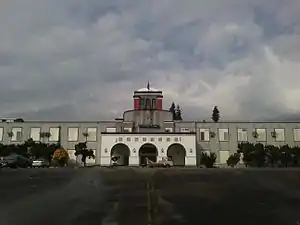
There are currently 22 District Courts (Chinese: 地方法院; pinyin: Dìfāng Fǎyuàn; Pe̍h-ōe-jī: Tē-hng Hoat-īⁿ) in Taiwan:[16]
| No. | Name | Chinese | No. | Name | Chinese | No. | Name | Chinese | ||
|---|---|---|---|---|---|---|---|---|---|---|
| 1 | Changhua | 臺灣彰化地方法院 | 9 | Lienchiang | 福建連江地方法院 | 17 | Tainan | 臺灣臺南地方法院 | ||
| 2 | Chiayi | 臺灣嘉義地方法院 | 10 | Miaoli | 臺灣苗栗地方法院 | 18 | Taipei | 臺灣臺北地方法院 | ||
| 3 | Ciaotou | 臺灣橋頭地方法院 | 11 | Nantou | 臺灣南投地方法院 | 19 | Taitung | 臺灣臺東地方法院 | ||
| 4 | Hsinchu | 臺灣新竹地方法院 | 12 | New Taipei | 臺灣新北地方法院 | 20 | Taoyuan | 臺灣桃園地方法院 | ||
| 5 | Hualien | 臺灣花蓮地方法院 | 13 | Penghu | 臺灣澎湖地方法院 | 21 | Yilan | 臺灣宜蘭地方法院 | ||
| 6 | Kaohsiung | 臺灣高雄地方法院 | 14 | Pingtung | 臺灣屏東地方法院 | 22 | Yunlin | 臺灣雲林地方法院 | ||
| 7 | Keelung | 臺灣基隆地方法院 | 15 | Shilin | 臺灣士林地方法院 | |||||
| 8 | Kinmen | 福建金門地方法院 | 16 | Taichung | 臺灣臺中地方法院 |
Each District Court may establish one or more summary divisions for the adjudication of cases suitable for summary judgment. The civil summary procedure is for cases involving an amount in controversy of not more than 300,000 New Taiwan dollar and for simple legal disputes.[16] Currently there are a total of 45 divisions in Taiwan.[16] Additionally, there is a Taiwan Kaohsiung Juvenile Court, established in accordance with the Law Governing the Disposition of Juvenile Cases.[16]
Each of the District Courts has civil, criminal and summary divisions and may establish specialized divisions to handle cases involving juveniles, family, traffic, and labor matters as well as motions to set aside rulings on violations of the Statute for the Maintenance of Social Order.[16] Each division has a Division Chief Judge who supervises and assigns the business of the division. Each District Court has a Public Defenders' Office and a Probation Officers' Office.[16]
A single judge hears and decides cases in ordinary and summary proceedings as well as in small claims cases.[16] A panel of three judges decides cases of great importance in ordinary proceedings as well as appeals or interlocutory appeals from the summary and small claims proceedings.[16] Criminal cases are decided by a panel of three judges, with the exception of summary proceedings which may be held by a single judge.[16] The Juvenile Court hears and decides only cases involving juveniles.[16]
Special courts
Administrative court
The administrative courts (Chinese: 行政法院; pinyin: Xíngzhèng Fǎyuàn; Pe̍h-ōe-jī: Hêng-chèng Hoat-īⁿ) handle cases regarding administrative litigation. The current administrative litigation system adopts a "Two Level Two Instance System" litigation procedure. The administrative courts are classified into the High Administrative Court, which is the court of first instance, and the Supreme Administrative Court, which is the appellate court. The first instance of the High Administrative Court is a trial of facts. The Supreme Administrative Court is an appellate court.
| Name | Chinese |
|---|---|
| Supreme Administrative Court | 最高行政法院 |
| Taipei High Administrative Court | 臺北高等行政法院 |
| Taichung High Administrative Court | 臺中高等行政法院 |
| Kaohsiung High Administrative Court | 高雄高等行政法院 |
| Tainan High Administrative Court (planned) | 臺南高等行政法院(籌設中) |
Intellectual property court
The intellectual property court (Chinese: 智慧財產法院; pinyin: Zhìhuìcáichǎn Fǎyuàn; Pe̍h-ōe-jī: Tì-hūi-châi-sán Hoat-īⁿ) [17] handles cases regarding intellectual properties.
Disciplinary court
The disciplinary court (Chinese: 懲戒法院; pinyin: Chéngjiè Fǎyuàn; Pe̍h-ōe-jī: Têng-kài Hoat-īⁿ) [18] maintains official discipline and punishes public servants, regardless of rank or appointment, for violations of the law or negligence in his or her duty in accordance with Article 77 of the Constitution.
Judges
Article 80 of the Constitution states that Judges shall be above partisanship and shall, in accordance with law, hold trials independently, free from any interference.[1] Furthermore, Article 81 states that Judges shall hold office for life.[1] No judge shall be removed from office unless he has been guilty of a criminal offense or subjected to disciplinary measure, or declared to be under interdiction.[1] No judge shall, except in accordance with law, be suspended or transferred or have his salary reduced.[1] Judges shall be appointed from those persons who have passed the Examination of Judicial Officials, completed the Training Course for Judicial Officials and possessed distinguished records after a term of practice.[3]
President and Vice President of Judicial Yuan
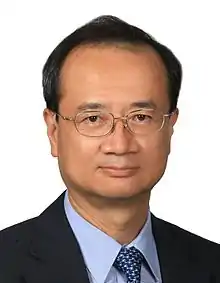
Since a constitutional amendment ratified in 1997, the President and Vice President of the Judicial Yuan need to be justices. However, they are not subject to the 8-year term limit like the other 13 justices. In the current constitution, the President and Vice President of the Judicial Yuan shall be nominated by the President of Taiwan and approved by the Legislative Yuan (the parliament of Taiwan).
Before 1947 Constitution
| President | Vice President |
|---|---|
|
1947 Constitution
| Term | Date | President | Vice President | Note |
|---|---|---|---|---|
| 1 | July 1948 – May 1950 | Wang Ch'ung-hui | Shi Zhiquan | Inaugurated in Nanking and moved to Taipei |
| May 1950 – March 1958 | Hsieh Kuan-sheng | President Wang Chung-hui died in office | ||
| March 1958 – June 1958 | Vice President as Acting President | |||
| 2 | June 1958 – July 1965 | Hsieh Kuan-sheng | Fu Bingchang | Vice President Fu Ping-chang died in office |
| July 1965 – July 1966 | Post vacant | |||
| July 1966 – December 1971 | Xie Yingzhou | President Hsieh Kuan-sheng died in office | ||
| 3 | December 1971 – April 1972 | Tien Chung-chin | Vice President Hsieh Ying-chou died in office | |
| April 1972 – July 1972 | Post vacant | |||
| July 1972 – March 1977 | Tai Yen-hui | President Tien Chung-chin died in office | ||
| 4 | April 1977 – July 1979 | Tai Yen-hui | Han Chung-mo | Tai Yen-hui is the first Taiwanese President |
| 5 | July 1979 – May 1987 | Huang Shao-ku | Hung Shou-nan | |
| 6 | May 1, 1987 – May 1, 1993 | Lin Yang-kang | Wang Tao-yuan | |
| May 1, 1993 – Sep 1, 1994 | Lu Yu-wen | |||
| 7 | Sep 1, 1994 – Aug 1, 1998 | Shih Chi-yang | ||
| Aug 1, 1998 – Feb 1, 1999 | Post vacant | Constitution amended, justices took over the positions |
1997 Constitution amendment
| Term | Date | President | Vice President |
|---|---|---|---|
| 1 | Feb 1, 1999 – Sep 30, 2003 | Weng Yueh-sheng | Cheng Chung-mo |
| 2 | Oct 1, 2003 – Apr 7, 2006 | Weng Yueh-sheng | Cheng Chung-mo |
| 3 | Apr 7, 2006 – Sep 30, 2007 | Lai In-jaw | |
| 4 | Oct 1, 2007 – Jul 18, 2010 | Lai In-jaw | Hsieh Tsai-chuan |
| Jul 19, 2010 – Oct 12, 2010 | Vice President as Acting President | ||
| 5 | Oct 13, 2010 – Oct 31, 2016 | Rai Hau-min | Su Yeong-chin |
| 6 | Nove 1, 2016 – present | Hsu Tzong-li | Tsai Jeong-duen |
See also
- Additional Articles of the Constitution of the Republic of China
- Constitution of the Republic of China
- Six Codes
- Law of Taiwan
- Law schools in Taiwan
- Supreme Court of the Republic of China
- High Court (Taiwan)
- District Court (Taiwan)
- Ministry of Justice (Taiwan)
- Supreme Prosecutors Office
- Taiwan High Prosecutors Office
References
- See Constitution arts. 77-82, available at "Constitution of the Republic of China (Taiwan)". January 1, 1947.
- See Additional Articles of the Constitution art. 5, available at "Additional Articles of the Constitution of the Republic of China (Taiwan)". July 10, 2005.
- See Introduction to the Judicial Yuan, available at "Judicial Yuan >> About Us >> Introduction".
- "Justices of the Constitutional Court". October 1, 2019.
- No. 1
- No. 31
- No. 86 Separation of the Judicial and the Prosecutorial Institutions Case
- No. 99
- No. 261 Terms of Office of the First Congress Members Case
- No. 328
- No. 365 Father’s Preferred Parental Rights Case
- No. 499 Unconstitutional Constitutional Amendments Case
- No. 644 The Prohibition against Associations Advocating Communism or Secession Case
- No. 748 Same-Sex Marriage Case
- See, Taiwan High Court, available athttp://tph.judicial.gov.tw/en/default.htm (last visited Mar. 28, 2012)
- See, Taipei District Court, About Us - Organization,http://tpd.judicial.gov.tw/indexen.asp?struID=52&navID=53&contentID=125 (last visited Mar. 28, 2012)
- "Intellectual Property Court". July 17, 2020.
- "懲戒法院 (Disciplinary Court)". July 17, 2020.
External links
| Wikimedia Commons has media related to Judicial Yuan. |
| Wikibooks has a book on the topic of: Annotated Republic of China Laws/Additional Articles of the Constitution of the Republic of China/Article 5 |
